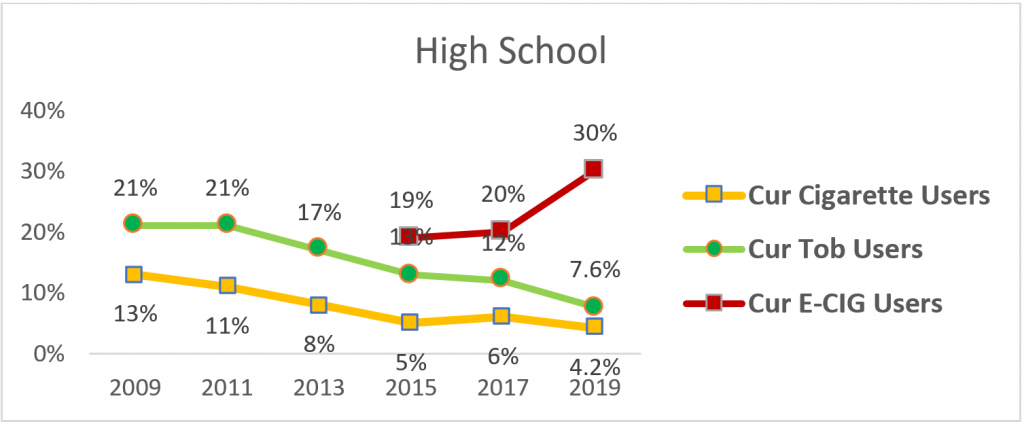Smoking remains a major public health challenge in Rhode Island. While Rhode Island has one of the lowest reported youth smoking rates in the US at 4.2%, and smoking rates have declined from 17.4% to 14.4% from 2011-2016 for adults and 13% to 4.2% from 2009-2019 for high school students, roughly a quarter of RI’s low-income population still smokes. Tobacco use caused 1800 deaths per year and cost $640 million in health care expenses in Rhode Island in 2009, and as of 2019 the state had 174,400 adult tobacco and e-cigarette users, 27% of whom used electronic cigarettes.
As smoking prevalence rates among US adults and youth have continued to decline, the introduction of e-cigarettes in US has created a considerable debate over policy interventions towards e-cigarettes, specifically with regards to youth initiation and use. In October 2019, Governor Gina Raimondo issued an emergency executive order banning the sale of flavored electronic nicotine delivery systems in Rhode Island, to deter use to youth. Raimondo’s order came in response to a rise in youth E-cigarette use to 30% of high schoolers and 6.5% of middle schoolers as of 2019, as well as studies finding that flavored e-cigarettes entice youth uptake and continued use (Harrel et al 2017).

Based on current evidence, however, we believe that encouraging existing adult smokers to switch to vaping is an important harm reduction strategy, and that e-cigarette flavor restrictions can have measurable consequences for both youth and adult smoking cessation.
A discrete choice experiment by Pesko et al. 2016 found that flavor variety is an important component in young smokers’ decisions to choose e-cigarettes in favor of combustible cigarette smoking. In another discrete choice experiment, Buckell et al. 2017 found that e-cigarette flavor bans led adult smoking of combustible cigarettes to increase from 45.2% to 53.5%. Conversely, surveys before and after the EU’s 2020 menthol cigarette ban found that this ban would lead to increased adoption of e-cigarettes and other harm reduction products.
The 2019 PATH study sponsored by the FDA Center for Tobacco Products (Schneller et al 2019) suggests that many adults using e-cigarettes to quit smoking prefer flavored cigarettes. Harrell et al 2017 found that tobacco and mint/menthol flavored e-cigarettes could be most helpful for adults who wish to quit smoking, and proposed that eliminating sweet flavors alone may offer the most benefit to youth prevention efforts, with further study needed on the impact on adult smoking cessation.
Smoking cessation is a priority for Rhode Island public health, which makes nicotine replacement therapy (NRT) available at no charge to adults (RI DoH Press Release 2019). Despite this strong commitment, RI fails to recognize emerging new evidence by (Hajek et al 2019) showing that e-cigarettes are more effective for smoking cessation than nicotine replacement therapy (NRT) when both products are accompanied by behavioral support, and a 2020 Cochrane review finding moderate certainty evidence that quit rates were higher in people randomized to e-cigarettes versus NRT or behavioral support only. These suggest that states committed to smoking cessation may need to include e-cigarettes as part of a comprehensive cessation program, as is the case in the UK.
In summary, we believe that policy decisions such as flavor restrictions on e-cigarettes need to be evidence-based, and should deter youth smoking and vaping without creating hurdles for adult smokers to switch from deadly combustibles to less risky e-cigarettes.
© 2023 Foundation for a Smoke-Free World. All rights reserved.